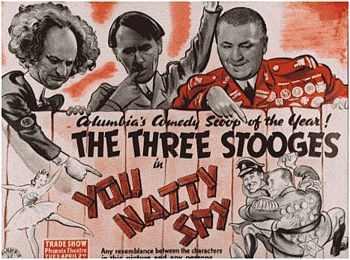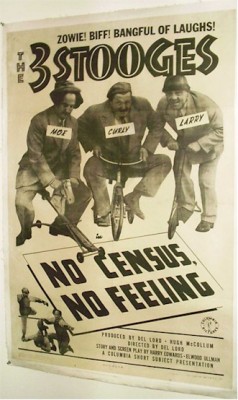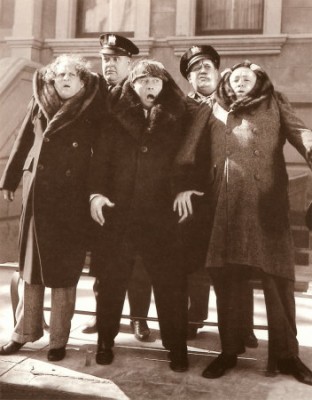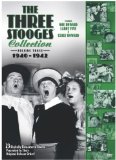| Reviews & Columns |
|
Reviews DVD TV on DVD Blu-ray 4K UHD International DVDs In Theaters Reviews by Studio Video Games Features Collector Series DVDs Easter Egg Database Interviews DVD Talk Radio Feature Articles Columns Anime Talk DVD Savant Horror DVDs The M.O.D. Squad Art House HD Talk Silent DVD
|
DVD Talk Forum |
|
|
| Resources |
|
DVD Price Search Customer Service #'s RCE Info Links |
|
Columns
|
|
|
Three Stooges Collection - Volume Three - 1940-1942, The
You Nazty Spy! (1940)
"There's no money in peace!" declare three greedy capitalists, "We must find someone stupid enough to do what we tell him!" Sound familiar? Paper-hanger Moe Howard is tapped as the new dictator of Moronika in this atypically topical political satire with the Stooges as stand-ins for Hitler (Moe, who in makeup and costume bears an uncanny resemblance), Mussolini (Curly) and Josef Goebbels (Larry). Released nine months before Charlie Chaplin's acclaimed The Great Dictator but put into production after Chaplin's film started shooting, You Nazty Spy! was riding that film's publicity, clearly. Nevertheless, while there had been anti-Fascist films like Confessions of a Nazi Spy before this, the Stooges were the first in Hollywood to lampoon Hitler directly, in a film released just after the start of World War II in Europe, but when America was still clinging to an isolationist stance. A real throwback to the team's style of comedy from its Ted Healy days, even now it's unsettling to hear Moe crack wise about book burnings and concentration camps. And no wonder it was both Moe and Larry's all-time favorite short - imagine, uneducated Jewish Vaudevillians given the opportunity to thumb their noses so publicly at the world's most notorious anti-Semite, at a time when such public criticism was unheard of. (****1/2 out of *****)
Rockin' Thru the Rockies (1940)
Funny but routine short finds the Stooges as 19th century trail-drivers - Curly wears a skunk-skin cap - guiding three young starlets and their overbearing, hatchet-faced chaperone (Kathryn Sheldon) westward toward San Francisco. Not to be confused with their unaccountably obscure 1945 feature film of the same name, Rockin' in the Rockies has some good laughs (the highlight: an ice fishing sequence) but it's not distinctive. One of "Nell's Belles" is Linda Winters, who less than six months later as Dorothy Comingore was starring opposite Orson Welles in Citizen Kane. Her one line in the film, "Moe, let's get out of here!" is a long way from "I can't do this to you? Oh yes I can!" (****)
A Plumbing We Will Go (1940)
"Up to the basement!" A nominee for the Stooges' all-time best short, this one's brilliant: Mistaken for plumbers, Moe, Larry, Curly systematically proceed to trash a wealthy judge's home. Moe virtually destroys the basement, Larry makes like a prairie dog tunneling under the front lawn, looking for a shut-off valve ("I'll find this thing or else!"), while Curly, madly connecting pipes in a leaky bathroom, inadvertently traps himself in a maze of metal. His expressions of frustration, confusion, and panic are priceless. Also worth noting are the short's funny sound effects (squeaking pipes, etc.) and the brilliant comic turn by African-American comedian Dudley Dickerson ("This house has sho' gone crazy!") as the bewildered cook; isn't it about time we forgave actors like Dickerson and the great Mantan Moreland and recognize their comic genius? Also in the film is an early (though not the earliest by far) gag about commercial television, touted as a "television receiver" where, as prolific character actress Bess Flowers explains it, "You not only hear the broadcast, you actually see it on this screen." Thanks to the Stooges, a show about Niagara Falls takes on 3-D attributes as well. (*****)
Nutty But Nice (1940)
Pretty dreadful, meandering short casts the Stooges as singing comic waiters, billed as "hilarious hash slingers" hired by two doctors (Vernon Dent and John Tyrrell) to cheer up a little girl hospitalized for depression after her father is kidnapped. Inexplicably, the Stooges clown around dressed as little girls and, rare for the team during this period, are totally unfunny! Later scenes team the Stooges with Moe's real-life next-door neighbor, character actor Ned Glass (Sgt. Bilko, Julia, Charade), who also appeared in some of Buster Keaton's Columbia shorts during this time, and can even be glimpsed as the lead (but uncredited) stormtrooper in You Nazty Spy! (** 1/2)
How High Is Up? (1940)
This short opens with several funny gags: a bee flying in and out of Curly's mouth while he's snoozing, the sound-asleep Stooges washed down city streets, bed and all, when a fire hydrant breaks. Later the trio winds up working as riveters - for the princely sum of a dollar an hour - at a construction site, on the 97th floor. The Stooges' world is unusually nasty in this one, more akin to Laurel & Hardy's universe, with abusive cops and threatening bosses ("Any more stalling and I'll throw you off the building!") Look for Bruce Bennett as one of the construction workers. The former movie Tarzan was reduced to pitiful bit parts like this one for several years before making an incredible career comeback; by 1948 he was back on top in a memorable role in Treasure of the Sierra Madre, a half-century before his death last year at the age of 101! (****)
From Nurse to Worse (1940) [new to DVD]
The Three Stooges commit insurance fraud in this short, egged on by a crooked insurance salesman friend (Lynton Brent). Curly pretends to be insane (not much of a stretch) but instead of certifying him, Dr. D. Lerious (Vernon Dent) wants to operate: a "cerebrum decapitation" no less! Kudos here to the virtually unknown bit player Johnny Kascier, as the hospital orderly taking spectacular pratfalls worthy of Keaton in a running (and falling!) gag. Least-quoted Stooge line, Moe to Larry: "Shoot the money to me, honey!" (***)
No Census, No Feeling (1940)
It's 1940 and "We're working for the census!" says Moe. "You mean Will Hays?" Curly asks. (Inside joke: Hays headed Hollywood's Production Code.) The team then drives everyone nuts asking questions like, "Are you married or happy?" They then turn up at a typical high society bridge party where Curly, mixing a batch of fruit punch, accidentally adds that favorite ingredient of slapstick comedians and cartoon directors everywhere: powdered alum, resulting in a mass puckering-up of lips. The whole thing ends with the Stooges surveying football players from USC right in the middle of a game. The quarterback? You guessed it: Bruce Bennett. (*** 1/2)
Cookoo Cavaliers (1940) [new to DVD]
As in the classic Laurel & Hardy short Towed in a Hole, the Stooges come up with the bright idea to "eliminate the middle-man" by catching and selling their own fish, but after a month no one's buying. "And you nearly talked us into buying ice," Larry chastises Curly, "just to put on the fish!" Moving on, the trio thinks they've gone into the saloon business but actually have purchased a salon in the sleepy village of Cucaracha, Mexico. When four women turn up wanting their hair bleached, Larry is undeterred: "I soar a guy paint a car with a spray gun once!" Usually the Stooges bonk each other around but in this unusually sadistic short the women take the brunt of the abuse. Dorothy Appleby, the pint-sized, apple-cheeked brunette who did shorts with Keaton, Andy Clyde, and Charley Chase as well as the Stooges, really takes a beating in this one. When Moe and Larry give her a "mud pack" (actually quick-drying cement, which Moe later breaks off with a sledge hammer), Appleby really seems to suffocating, squirming uncomfortably. And what ever happened to the dog doused with hair removal? (**** 1/2)
Boobs in Arms (1940)
Them Stooges never got any credit. First they beat Chaplin to the punch with their own Hitler spoof, and in Boobs in Arms they scooped Abbott & Costello with a basic training comedy almost identical, structure-wise, to Buck Privates and released it one month earlier. "See the world, or what's left of it!" promise recruiting posters (they should use that slogan today!). The training sequence with an exasperated Richard Fiske as their drill sergeant (the role played in Buck Privates by Nat Pendleton) is about as funny as the same sequence in Abbott & Costello's film. "Everything happens to me!" Fiske says several times in the film. Ironically, he was right: the poor guy really was drafted soon thereafter, and killed in action in LeCroix, France, shortly after D-Day. (****)
So Long Mr. Chumps (1941) [new to DVD]
My favorite Stooge title (a play, of course, on the popular MGM film Goodbye, Mr. Chips) casts Moe, Larry, and Curly as street cleaners, and the opening sequence with them trying to sweep up a city park is a gem. The serpentine plot has them hired to find an "honest man" with executive abilities, then segues into a prison spoof with boys making little rocks out of big ones. Though it's all over the map there are plenty of funny gags (and violent ones: watch Moe dislocate Curly's jaw!) in this Felix Adler-scripted two-reeler, including a rare fade-out with the Stooges stepping out-of-character; Moe and Larry look taken aback by what seems like an ad-lib from Curly. (*** 1/2)
Dutiful but Dumb (1941)
Click, Clack and Cluck (guess who) are paparazzi assigned by Whack illustrated magazine ("If it's a good picture, it's out of Whack!") to shoot a newly-eloped movie star. When that ends in disaster ("I'm positive about the negative," Curly says, "But I'm a little negative about the positive!") their beleaguered editor (Vernon Dent) ships them off to Vulgaria, where taking pictures is a capital offense. Okay short has two outstanding Curly set pieces: a variation of the old live oyster-in-the-soup gag, a surefire bit dating back to the silent days; and a hilariously performed sequence with Curly hiding inside a radio, trying to fake a broadcast. Look for perennial house dick/Irish cop Fred Kelsey cast against type as a Vulgarian colonel. (*** 1/2)
All the World's a Stooge (1941)
Weird short about a husband (Emory Parnell) fed-up with his eccentric wife's (Lelah Tyler) plans to take in a refugee "from the war-torn fields of, well, somewhere." The husband then concocts a bizarre plan: he hires the 40-ish Stooges to pretend to be elementary school-age children (with Larry improbably dressed as a little girl). This being a two-reel comedy, everyone unhesitatingly accepts these middle-aged men with Brooklyn accents as European children. After the anti-fascist You Nazty Spy!, this short is confusingly anti-philanthropic (or something) though early scenes with the Stooges as window washers mistaken for dentists (at the offices of I. Yankum) are pretty funny. When Moe mistakenly yanks out a patient's bridge Larry remarks, "You've stripped his gears!" (** 1/2)
I'll Never Heil Again (1941)
This follow-up to You Nazty Spy!, released five months before Pearl Harbor, revisits Moronica (spelled here with a "C") with more explicit references to Nazis and their allies and with Cy Schindell taking over the Mussolini role, allowing Curly to play Hermann Göring, er, Field Marshal Herring. "The characters in this picture are fictitious," insist the opening titles, "Anyone resembling them is better off dead." Spaniard Duncan Renaldo, future Cisco Kid, plays the Japanese representative, who snaps away taking pictures, even while fighting Moe. (I had assumed the stereotype about Japanese shutterbugs originated after World War II.) There's a Stalin stand-in (Don Barclay) too, but the Soviet Union had joined the Allies by the time this was released (Oops!), and Jack "Tiny" Lipson, former King Vultan in Flash Gordon, is the Bay of Rum. (****) I especially liked this exchange involving an astrologer, actually a spy:
Princess Gilda (spy): I am your new soothsayer, the seeress
Minister of Propaganda (Larry): Your father must be Roebuck.
Princess Gilda: No, for I was raised by Montgomery.
Field Marshal Herring: Oh, you're Montgomery's ward!
An Ache in Every Stake (1941)
Though overly familiar (it's one of those shorts reissued a gajillion times) this is one of the all-time greats. It was writer Lloyd French's only Stooge script; prior to this he had been an assistant director and later credited director on numerous Laurel & Hardy comedies, including Big Business and Busy Bodies. Obviously, here he borrows the basic premise of Laurel & Hardy's much-loved The Music Box, with the Stooges trying to deliver a big block of ice up a long flight of steps, just as Laurel & Hardy did with an upright piano a decade before. Though many assume they were shot on the same set of steps, in fact they were filmed a few miles apart (there's no intersection at the bottom of the Music Box steps), though both are in the Silverlake area east of Hollywood. (The Ache in Every Stake steps are at 2257-58 Fair Oak Terrace.) Highlights include Curly "shaving" some ice and stuffing a turkey. (*****)
In the Sweet Pie and Pie (1941)
The Stooges threw a lot of pies in their career, but this is probably their best all-around pie-fighting short, one of their very best overall. When three high society girls, Tiska (Dorothy Appleby), Taska (Mary Ainslee) and Baska (Ethelreda Leopold) stand to lose their inheritance unless they marry, lawyer Diggin (Richard Fiske, in his last appearance with the team) persuades them to marry the Stooges, on death row after wrongly being pegged as the Mushroom Murder Gang. Ah, but the trio escape the hangman's noose when they're pardoned by the governor and the girls are stuck. Literal gallows humor abounds: "It's a g-r-r-reat day for a hanging!" enthuses a radio announcer, giving a "jerk-by-jerk" account. Beyond the great gooey finish, there's a wonderful scene with Curly (well, his double) trying to scale a hand-made triple bunk bed. Ominous sign of things to come: This is one of the first Stooge shorts to feature an entire sequence lifted from an earlier two-reeler, in this case stock footage of a dance lesson scene from Hoi Polloi (1935). (**** 1/2)
Some More of Samoa (1941) [new to DVD]
Moe, Larry, and Curly are tree surgeons examining a cranky old man's rare persimmon tree (Curly: "I don't like the sound of its bark!"). Moe determines the tree needs a mate, and the three are off to the island of Rhum Boogie (not Samoa) in search of the rare plant. Meandering short has lots of good gags: Curly grows to gigantic proportions after accidentally being injected with Vitamin PDQ, and later he tries to retrieve a baby tree from an alligator's mouth (note that the beast's jaws are tied shut before the real alligator is replaced by a hilariously fake rubber reptile). A few politically incorrect jokes - the Stooges imitate radio's Amos & Andy - may have prevented its release up to now. (*** 1/2)
Loco Boy Makes Good (1942) [new to DVD]
Immortal Dialogue Department: Customer to waiter Larry, "Do you have pâté de foie gras?" "I'll see if the band can play it," replies Larry, bemused. Refreshingly different Stooge short actually has a kind of story and something like production values. The Stooges decide to help a little old lady, the proprietress of a hotel badly in need of repairs and facing foreclosure. In the hotel's improbably vast nightclub, the Kokonuts' Grove, the trio whips up a comedy act to bring in the customers and to impress columnist Waldo Twitchell (John Tyrrell). (One of the fun things about watching these shorts as an adult is that you can enjoy all the references you missed as a kid.) The audience doesn't think much of the Stooges' song "She Was Bred in Old Kentucky but She's Just a Crumb Up Here," but then all hell breaks loose and everyone has a wild time, especially after Curly unleashes a swarm of white mice on the dance floor. Note Curly's suggestion that the old lady see "a single feature," implying that double-bills usually weren't accompanied by two-reel comedies. The first Stooge short released after the attack on Pearl Harbor, it was just the ticket for audiences looking for a little escape from the 24-7 war coverage. The magician's coat gag dates back at Harold Lloyd's Movie Crazy (1932); reportedly Lloyd sued for plagiarism and won. (****)
Cactus Makes Perfect (1942)
Curly invents a Gold Collar Button retriever that an inventors' associations labels "incomprehensible and utterly impractical." "Oh boy!" exclaims Curly, delighted, who's not even offended that his name was misspelled J-E-R-K. A-la Cash and Carry (with many of the same gags), the boys buy a phony map and start digging for gold, only to stumble upon a real mine. Comedian and gag writer Monte (Monty) Collins, in drag, co-stars as Ma Howard; he actually gives a pretty good performance, amusingly incorporating personality traits of both Moe and Curly. Also noteworthy for its hilariously painful bit where Moe shaves Curly with a straight razor, right down to the nose hairs. (***)
What's the Matador? (1942) [new to DVD]
In keeping with the nation's beefed-up Good Neighbor Policy, the Stooges are sent packing to Mexico (Wait a minute - is that such a neighborly thing to do?), to perform their comic bullfighting act ("We hope you like them too many!" says the announcer. So much for not pissing off Mexico.) There they befriend a young woman (Suzanne Kaaren, the Brooklyn-born wife of Sidney Blackmer) with an insanely jealous husband, Jose (Philadelphia-born Harry Burns). This is about the first short where one can see the earliest signs of Curly's pre-stroke personality change. It's very subtle, and while he's still quite funny, not the tragically addled comedian dragged through those last few shorts in 1946-47, one can see little changes in his screen persona, and about here he begins to age dramatically, with lines suddenly etched deep in his face. (***)
Matri-Phony (1942)
One of just two Stooge shorts directed by Harry Edwards, and it's easy to see why. This bland comedy with an "Ancient Erysipelas" setting has bad staging (the last shot inexplicably has extras walking straight into a wall), weird jump cuts and even out-of-focus shots. A real hodgepodge of historical inaccuracy, Matri-Phony has the Stooges working as stonecutters Mohicus, Larrycus, and Curlycue at Ye Olde Pottery and Stone Works ("the biggest chiselers in town!"). They get caught up in Emperor Octopus Grabus's (Vernon Dent, sans mustache) plans to marry "the fairest redhead of them all." Curly's slow decline is demonstrated in a scene where he tries to eat a live crab (with snapping claws), a variation of the oyster-in-the-soup gag from the previous year. It's reasonably funny, but Curly's timing is just a tad off and the two scenes make quite a contrast. (***)
Three Smart Saps (1942)
Master gagman Clyde Bruckman wrote this short, an odd one which has the Stooges infiltrating a jail taken over by mobsters who've imprisoned the warden (the trio's future father-in-law) and turned it into a kind of luxury hotel. For the second time in 17 months, the Stooges have to find a way to break into jail. In this short Curly's voice continues to mutate into something far removed from the Curly of the 1930s, but physically he's still in fine form: here he dances the Rumba and, like Oliver Hardy, is impressively light on his feet for someone so overweight. Also noteworthy: Curly imitates Jimmy Durante while Larry gets blotto. (** 1/2)
Even as IOU (1942) [new to DVD]
Damon Runyon adaptations were quite popular at this time, and this Runyonesque story finds the team winning $500 on a longshot, "Bearded Lady," only to turn around and blow their wad on what they think is talking horse, Seabasket, actually grifter Stanley Blystone throwing his voice. A syrupy subplot with the boys coming to the rescue of a dispossessed single mother (Ruth Skinner) and her little daughter is completely forgotten midway through and in the end Curly even steals the pathetic girl's piggybank! I guess they're still homeless out there somewhere. A colt is born at the end of this short, but who's the mother? Most assume it's Seabasket but others insist it's Curly (!) who gives birth to the tiny Equidae! (** 1/2)
Sock-a-Bye Baby (1942) [new to DVD]
The last short in this collection is both new to DVD and a pretty good one, basically Three Men and a Baby Stooge-style, and memorable for its chase finish with the team hiding in a car disguised as a large tent. The despondent wife (Julie Gibson, the real-life wife of Abbott & Costello director Charlie Barton) of a motorcycle cop (Clarence Straight) abandons her baby, Little Jimmy Collins (actually a girl, Joyce Gardner) in a basket on the Stooges doorstep. Moe makes a mammoth diaper out of a tablecloth, and they feed the poor toddler all kinds of inappropriate food: artichokes, pig's feet, and pickled herring, among other things. Released at the height of the war, the short has its share of awkwardly inserted propaganda: a frustrated Curly says, "[Spits] on the Japanese!" while Moe accuses an onion of being a Nazi. (*** 1/2)
Video & Audio
Reportedly, with the exception of a few shorts mastered during Sony's ill-advised colorization fetish, everything here is newly remastered and the results are as impressive as those found in the Volumes 1 and 2. The 396 minutes worth of Stooge comedy is crammed onto two single-sided dual-layered discs (10 on the first, 13 on the second), but there are no compression issues. The mono audio (English only, unlike some of the earlier DVD releases, which had multiple language options) is otherwise fine. There are no subtitle options, though the discs are closed-captioned.
Once again, no Extra Features. It's a shame Sony doesn't get one of the myriad Stooge experts out there to write liner notes. The ugly package design could use them.
Parting Thoughts
Though the seeds of Curly's illness are beginning to sprout - What will consumers make of the all-important 1946-1948 years, with Curly at his nadir and Shemp Howard at his peak, I wonder? - this is another goldmine of comedy, and is Highly Recommended.
Film historian Stuart Galbraith IV's latest book, The Toho Studios Story, is on sale now.
|
| Popular Reviews |
| Sponsored Links |
|
|
| Sponsored Links |
|
|
| Release List | Reviews | Shop | Newsletter | Forum | DVD Giveaways | Blu-Ray | Advertise |
|
Copyright 2024 DVDTalk.com All Rights Reserved. Legal Info, Privacy Policy, Terms of Use,
Manage Preferences,
Your Privacy Choices | |||||||
















